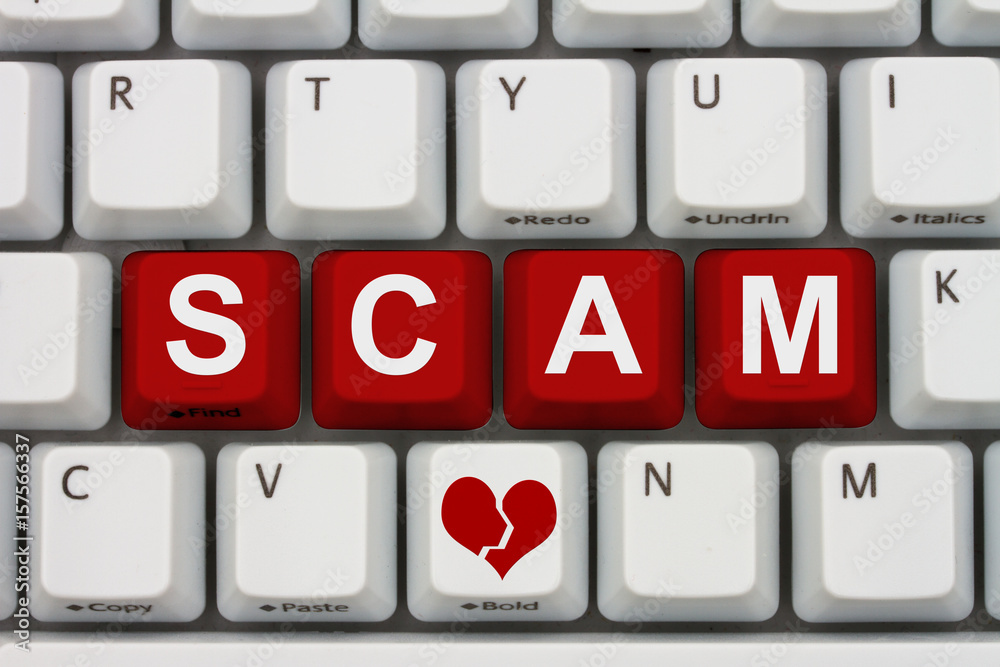Although the concern exists all year round, with Valentine’s Day just around the corner, romance scams are extremely prevalent at this time of year. This is a great time to stay aware and also check on family and friends who could unknowingly be falling prey to a catfishing scam or other romance related scheme.
Many people have turned to online dating and social media sites over the past few years to find love and/or meet new people. These platforms have not only made it easier than ever to meet new people and find dates, but unfortunately, they have also made it easier for someone to take on a fake persona and create a compelling backstory, potentially leading to them successfully pulling off a romance scam.
Most romance scams start with fake profiles on online dating sites created by stealing photos and text from real accounts. Scammers often claim to be in the military or working overseas to explain why they can’t meet in person. Over a short period of time, the scammer builds a fake relationship with their victim, exchanging photos and romantic messages, even talking on the phone or through a webcam.

Just when the relationship seems to be getting serious, the new sweetheart has a health issue or family emergency or wants to plan a visit. No matter the story, the request is the same: they need money. But after the victim sends money, there’s another request, and then another. Or the scammer stops communicating altogether. That’s the classic scenario of a catfish scam, and it can result in huge losses.
In addition to these schemes, the FBI has reported a new trend that involves international crypto investment fraud as part of romance scams. The scam starts similarly to the online relationship scheme, but instead of asking for funds to help with an emergency, the scammer asks their victim to make an investment in cryptocurrency.
Overall, the best way to combat romance schemes is to recognize what they look like, and the red flags associated with them. In addition to catfishing schemes, BBBs have seen reports of fake dating websites, and even traditional schemes using a romance theme to lure victims, such as fake check scams and money mule scams. In money mule scams, victims are tricked into moving illegal funds or items.
You can read more on each of these by visiting BBB’s romance scam resource page at bbb.org/romance. In the meantime, your BBB offers tips to help you and your loved ones identify and avoid catfishing scams:
Too hot to be true. Scammers offer up good-looking photos and tales of financial success. If they seem “too perfect,” your alarm bells should ring.
In a hurry to get off the site. “Catfishers” will try very quickly to get you to move off of a dating site or social media site and instead communicate through email, messenger, or phone.
Moving fast. A catfisher will begin speaking of a future together and tell you they love you quickly. They often say they’ve never felt this way before.
Talk about trust. Catfishers will start manipulating you with talk about trust and its importance. This will often be the first step to asking you for money.
Don’t want to meet. Be wary of someone who always has an excuse to postpone a meeting because they say they are traveling, live overseas, or are in the military.
Suspect language. If the person you are communicating with claims to be from your hometown but has poor
spelling or grammar, uses overly flowery language, or uses phrases that don’t make sense, that’s a red flag.
Hard luck stories. Before moving on to asking you for money, the scammer may hint at financial troubles,
such as their heat being cut off, car stolen, or a sick relative. They may also share a sad story from their past
(death of parents or spouse, etc.).
Protect yourself from this scam:
– Never send money or personal information that can be used for identity theft to someone you’ve never
met in person. Never give someone your credit card information to book a ticket to visit you. Cut off
contact if someone starts asking you for information like credit card, bank, or government ID numbers.
– Ask specific questions about details given in a profile. A scammer may stumble over remembering
details or making a story fit.
– Do your research. Many scammers steal photos from the web to use in their profiles. You can do a
reverse image lookup using a website like tineye.com or images.google.com to see if the photos on a
profile are stolen from somewhere else. You can also search online for a profile name, email, or phone
number to see what adds up and what doesn’t.
To report a scam, visit bbb.org/scamtracker. For more information, you can reach your BBB at BBB.org or
800-763-4222.
Kelvin Collins is president & CEO of the Better Business Bureau serving the Fall Line Corridor, serving 77
counties in East Alabama, West Georgia, Southwest Georgia, Central Georgia, East Georgia, and Western
South Carolina. This tips column is provided through the local BBB and the International Association of Better
Business Bureaus (IABBB). The Better Business Bureau sets standards for ethical business behavior,
monitors compliance and helps consumers identify trustworthy businesses. Questions or complaints about
a specific company or charity should be referred directly to the BBB at Phone: 1-800-763-4222, Web
site: BBB.org or E-mail: info@centralgeorgia.bbb.org
